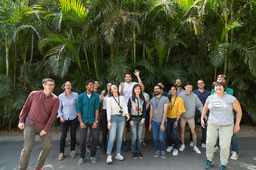Citing software continued
Published in Protocols & Methods

In the March 2019 issue of Nature Methods, we published an editorial entitled ‘Giving software its due’ (https://www.nature.com/articles/s41592-019-0350-x), in which we discussed the need for proper citation of software tools to ensure credit and reproducibility. As research for that editorial, we reached out to developers of popular software tools regarding their experiences.
The editorial generated a lot of discussion on Twitter (@naturemethods), and we want to continue the discussion here on our community page.
As a start, I will share some of the questions we asked the experts:
(1) Do you consider yourself to be a software/tool development group or do you develop tools only to meet the needs of your biological questions?
(2) If the latter, do you feel motivated to develop user-friendly tools or just usable code?
(3) Do you strive to publish your software tools as independent publications or as part of research ‘results’ papers?
(4) Do you find your software tools are typically appropriately cited? Correct versions, correct paper, etc.
(5) Do you use citations as a way to justify grants for tool development being funded?
(6) Has tool development helped you get or keep a job?
(7) What strategies do you use to get your tools cited? What is the best strategy you have seen?
(8) What could reviewers and editors do to ensure proper citations?
(9) What challenges have you faced when trying to correctly cite other software tools?
(10) What are tips for making tools that will stand the test of time?
(11) Do you keep track of software downloads? How do these compare to citations for established tools (> 5 yo)?
We would also like to raise a few new questions!
(12) What do you think is the best way to cite software? Does this differ when you are thinking about credit versus reproducibility?
(13) What journals do you think are setting the bar for reproducibility in terms of software development? What can we learn from them?
In addition, we want to use this opportunity to raise awareness about the ongoing trial that Nature Methods, Nature Biotechnology, and Nature Machine Intelligence are conducting with Code Ocean (@CodeOceanHQ) for generating executable software containers. For details see[https://www.nature.com/articles/s41592-018-0137-5]. The benefits of this include being able to run algorithms in the cloud, ensuring proper documentation and verify that code runs, assigning a DOI to guarantee a version of record for a software tool, and allowing anonymous peer review of code.
To end, we’d like to mention that our conversations with the community made us aware of The Journal of Open Access Software (JOSS, https://joss.theoj.org), a developer friendly, open access journal for research software packages, and Zenodo (https://zenodo.org/), a repository for software (among other things) that mints a DOI for submissions.
We welcome your feedback on any and all of the above in the comments below!
Follow the Topic
-
Nature Methods

This journal is a forum for the publication of novel methods and significant improvements to tried-and-tested basic research techniques in the life sciences.
Related Collections
With Collections, you can get published faster and increase your visibility.
Methods development in Cryo-ET and in situ structural determination
Publishing Model: Hybrid
Deadline: Jul 28, 2026




Please sign in or register for FREE
If you are a registered user on Research Communities by Springer Nature, please sign in